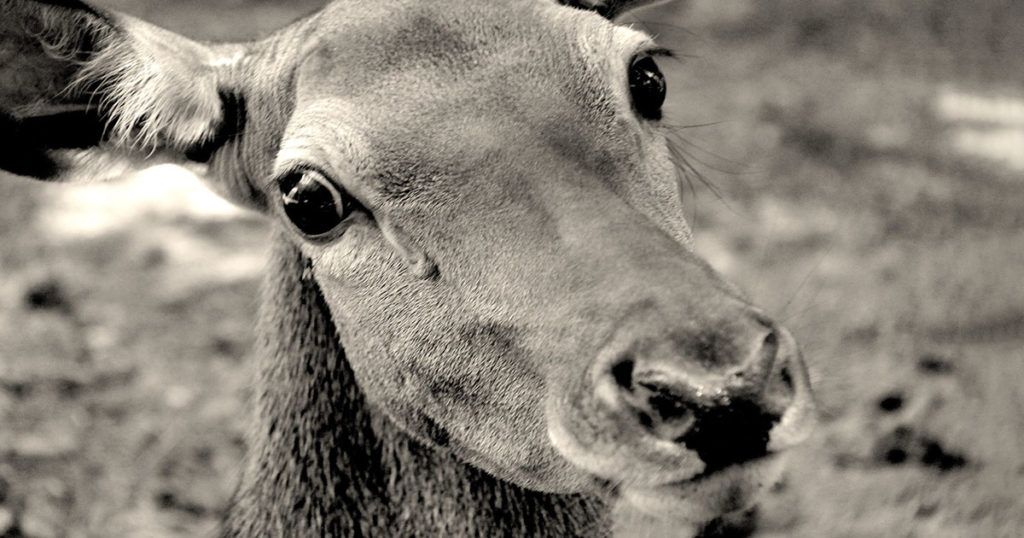
I’ve been attacked by mosquitoes, by ants, by the biting flies that seem to be the most prevalent kind in Gijón, and even by a dog. They had reasons: hunger, nature, confusion. Even the cats that have swiped at my leg as I’ve walked past and at my fingers as I’ve turned a page, were having fun. Even the stray cat I was petting that turned and sank its teeth into my index finger had the excuse of sickness and starvation. The bite became infected and because I couldn’t believe this was the result of my friendly concern, I ignored the red line extending from my hand until it had reached my armpit. But up until one sunny July morning in Durango, Colorado, this past summer, never was I attacked by a deer.
You didn’t see deer in town when I was growing up there, but for the past 15 years they’ve been a common sight, crossing roads or foraging in gardens or parks. My folks’ back yard abuts a steep hillside that rises to the mesa above the town, and deer frequent the paths and gullies there among the Gambel oak and the junipers. One early morning I took the dog for a walk, as usual, climbing the hillside on one trail and taking a different one down. After a short stretch on a paved road, I was about to turn onto the diversion ditch that would complete the circle and leave me back at my folks’ yard. On the hillside right above the road I saw some movement as two young deer slipped between some brush and out of sight. A third remained, looking down on us. I stopped with Zoey, she on her leash, to watch.
When my children were little, I often generalized the name of an animal character so that it served as an identifier for the species. A collie on the street would be a Lassie, rabbits in a hutch a lot of Thumpers, and a deer a Bambi. “Pretty deer,” I thought that morning, watching the lone deer after the other two had disappeared. It was a female, on the small side, a pretty little Bambi. And the deer responded, swiveling slowly, stepping gingerly, turning to face us. She seemed more intent on the dog, exactly the same gingery brown as she was, than on me. She wanted to make friends, and she came so carefully, so silently, that Zoey and I stood transfixed. Forty feet away, 30, 20. Ten. She circled us, stopping six feet away. I could have reached out and stroked her nose. This was a surprise. And then she came closer.
Not yet alarmed, just uncomfortable, I stepped back. She leaped forward, I ran behind a large boulder, and, my heart beating, peeked around the far side. But she had swiveled back and was again facing me. She seemed to spring at us, and the hooves that came first seriously frightened me. I gave a yelp and fled back onto the paved road, empty at that early hour.
She did not retreat up the hillside. Instead, she blocked my path to the diversion ditch. Zoey, all this while, had shown no shred of aggression, but merely kept close to my side. I looked at her, and she looked up at me. Could we risk a charge past the deer? I started forward, but the deer did too, so I stopped. The sensible action would be to take Zoey and go the long way round through the streets of the town, leaving the hillside to the deer. Her hillside much more than mine. But if I would share with her, why wouldn’t she with me? Why couldn’t she see we were no threat and meant no harm? I was determined to show her that by passing her. She started up the hillside, leaving the entrance to the ditch free. This was my chance.
But she was just as determined that I shouldn’t have my way, and before I’d reached the big boulder, she had returned, not slowly and stealthily as the first time she’d cut me off, but with impatience and displeasure. With a squeal, I retreated.
Anyone witnessing us would have surmised the deer was protecting her young, and when a man came along the ditch and took in the situation, he said exactly that. “She’s just protecting her babies.”
Of course she was. I’d have done the same for my boys when they were little, though the protective instinct is weaker now that they’re butting heads against the world. But I was no threat to the deer or her fawns. Couldn’t she tell?
It wasn’t me, the man had said before he disappeared down a side path on the far side of the deer, it was my dog.
While I thought about that, the deer moved off, back up the hillside. I seized my chance and ran pell-mell down the ditch, the leash flapping, Zoey galloping at my side.
It’s not you, the man had said. “It’s not me,” I told Zoey, “it’s you.” To take the sting away, I stopped when we were safe and petted her. But the next biting fly that lands on my bare leg, I might turn the tables. Sorry, it’s not about you, I can hear myself say as I raise a fly swatter, it’s about me.

